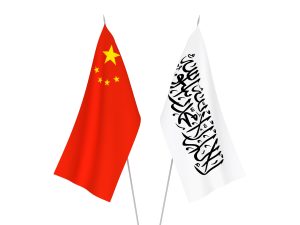The Taliban Wednesday hailed China’s new ambassador to Afghanistan with fanfare, saying his arrival is a sign for other nations to come forward and establish relations with them.
Ambassador Zhao Sheng’s car swept through the tree-lined driveway of the Presidential Palace escorted by a police convoy. He was greeted by uniformed troops and met top-ranking Taliban officials, including Mohammad Hassan Akhund, who heads the administration, and Foreign Affairs Minister Amir Khan Muttaqi.
It is the first time since the Taliban takeover that an ambassador to Kabul has been afforded such lavish protocol.
The Taliban seized power in August 2021 as U.S. and NATO forces withdrew after two decades of war. Their leaders are under sanctions and no country recognizes them as Afghanistan’s legitimate rulers. The country’s seat at the United Nations is still held by the former Western-backed government that was led by Ashraf Ghani.
Only a handful of nations have working diplomatic missions in Afghanistan, including China, the world’s second-largest economy. The two sides have been open about their desire for closer ties, especially commercial ones. China has not yet extended formal diplomatic recognition to the Taliban regime, but it is now the first country to appoint a new ambassador to Afghanistan since the Taliban took power. Previously, China’s diplomatic activities in Afghanistan were spearheaded by the embassy’s charge d’affaires, Zhao Haihan.
Muttaqi said that China and Afghanistan had special ties and that Zhao Sheng’s nomination was a “significant step with a significant message.” He did not elaborate further.
The Taliban’s chief spokesman, Zabihullah Mujahid, told The Associated Press that it is tradition for new ambassadors to present their credentials to the head of the country.
“It also signals to other countries to come forward and interact with the Islamic Emirate,” said Mujahid. “We should establish good relations as a result of good interactions and, with good relations, we can solve all the problems that are in front of us or coming in the future.”
He did not answer questions on what Zhao’s presence meant for the Taliban’s demand for official recognition.
The international community, wary of the Taliban’s rule when they were last in power more than 20 years ago, has withheld official recognition and Afghanistan’s assets abroad have been frozen.
China has been among the countries most willing to engage with the Taliban, although so far it too has stopped short of recognizing the Taliban government. Foreign Minister Wang Yi became one of the first foreign officials to visit the new regime, making a surprise stopover in Kabul in March 2022. At the time, Muttaqi proclaimed the visitors from China to be “the most important high-level delegation received by Afghanistan.”
Since then, Beijing has repeatedly encouraged Afghanistan’s participation in the Belt and Road Initiative and voiced support for frozen national assets to be returned to the Taliban. In turn, the Taliban have accorded all diplomatic priorities to China, including the new ambassador’s lavish welcome.
In late August, shortly after the second anniversary of the Taliban’s return to power, Zhao Haihan, the Chinese embassy charge d’affaires, had only positive comments to make about Afghanistan’s trajectory.
Zhao told China’s Global Times in an interview that the “Afghan interim government” – notably, he refrained from ever using the word “Taliban” – “has been committed to promoting national peace reconstruction and independent development, actively engaging in foreign exchanges and cooperation, and has taken a series of practical measures in areas such as economic development, corruption eradication, drug prohibition, improvement of people’s livelihoods, and social security, achieving certain results.”
He added that Chinese embassy staff “can feel that this country is gradually recovering.”
Neither the charge d’affaires nor Global Times’ interviewers mentioned the state of human rights in Afghanistan, especially the Taliban’s extreme restrictions on women and girls, who are banned from nearly all public activities. Earlier this week, the United Nations’ human rights chief warned that the “shocking level of oppression of Afghan women and girls is immeasurably cruel.”
































